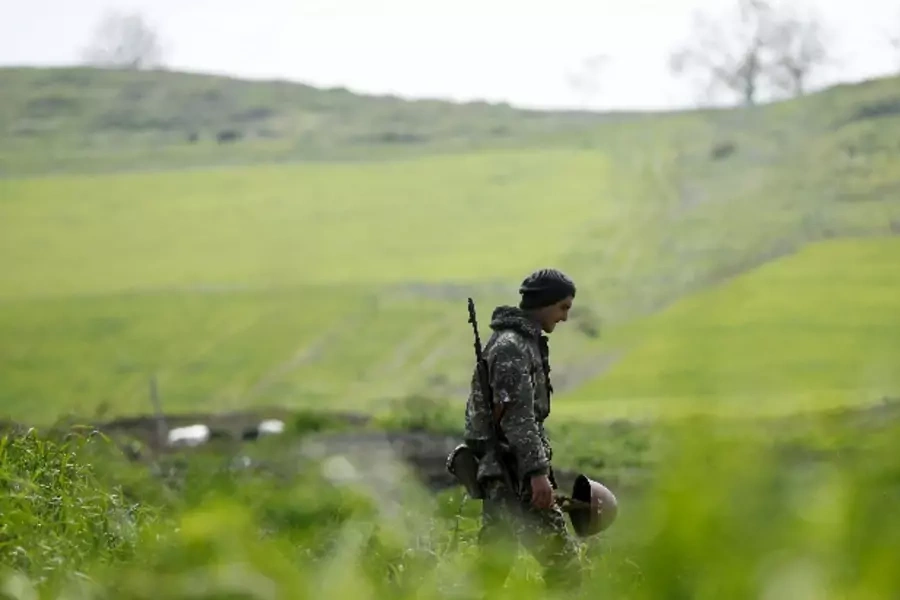Will Nagorno-Karabakh’s Frozen Conflict Heat Up?

Eshani Bhatt is an intern in the Center for Preventive Action at the Council on Foreign Relations.
Last weekend, a firefight erupted between Azerbaijani forces and Armenian-backed separatists near the breakaway region of Nagorno-Karabakh, killing five Azerbaijanis. Nagorno-Karabakh remains a hotbed of tension after skirmishes along the line of contact, which separates Nagorno-Karabakh from the rest of Azerbaijan, escalated and killed one hundred people in April 2016, marking the worst violence since a 1994 cease-fire agreement. The contested region in the southwestern part of Azerbaijan is made up of mostly Armenians who have sought to break away since 1988 when Azerbaijan and Armenia gained their independence. Nagorno-Karabakh forces, with the support of Armenia, then waged a full-scale war against Azerbaijan and gained control of almost 20 percent of Azerbaijan’s geographic area over six years before the 1994 cease-fire was reached.
More on:
Due to increased tensions since April 2016, Russia’s treaty commitment to defend Armenia, Turkey’s pledge to protect Azerbaijan, and a peace process that has stalled, increased firefight could have expansive implications for Eastern Europe and the United States’ relationship with Russia. In a new contingency planning memorandum from the Council on Foreign Relations’ Center for Preventive Action, Carey Cavanaugh outlines in “Renewed Conflict Over Nagorno-Karabakh” that the likelihood that violence between Armenia and Azerbaijan will escalate in the next twelve months is high. Both countries have weak economies and unreliable infrastructure, and prolonged fighting could cause major disruptions in Azerbaijan’s delivery of energy resources to Western markets. New oil and gas pipelines in the South Caucasus have the potential to become critical alternatives to energy imports to the European Union, Azerbaijan, Turkey, and Georgia, reducing energy dependence on Russian gas. Several contingencies, either inadvertent military action or deliberate provocation by either side, could ignite conflict and entangle outside actors, including Russia, Iran, and Turkey, which is a U.S. North Atlantic Treaty Organization (NATO) ally.
The Organization for Security and Cooperation in Europe’s Minsk Group, which the United States co-chairs with Russia and France, is in charge of the mediation process between Armenia and Azerbaijan. The United States has long been interested in promoting democracy and economic independence in former Soviet countries, including Azerbaijan, and is invested in preserving peace in Eastern Europe. War over Nagorno-Karabakh jeopardizes U.S. efforts over the past two decades to promote the political and economic stability within the Caucasus region. While Russia is committed to defend Armenia by treaty, it benefits from an economic relationship with Azerbaijan, supplying more than 80 percent of the country’s recent armaments purchases—four billion dollars since 2010. This contingency planning memorandum argues that working with Russia to resolve this conflict could be an opportunity to improve U.S.-Russian relations, as both countries have an interest in minimizing violence between Armenia and Azerbaijan.
Cavanaugh offers a range of preventive options for the United States to employ in order to avoid a major escalation of violence:
- Encourage the Minsk Group to transfer mediation authority to the United Nations or threaten to withdraw from the Minsk Group leadership, in order to pressure parties to work toward a solution.
- Push parties to implement confidence- and security-building measures that Armenia and Azerbaijan have already agreed upon and explore more effective measures.
- Threaten to discourage economic support, through international financial institutions, and private investments unless both countries illustrate a willingness to compromise.
- Explore the possibility of including Turkey in periodic Minsk Group discussions.
Ultimately, Cavanaugh argues that the United States should pressure Armenia and Azerbaijan to compromise, adopting a more assertive approach to mediation through its role as a Minsk Group co-chair. Cooperating with Russia to resolve the conflict over Nagorno-Karabakh presents an important opportunity to improve the U.S.-Russian relationship.
More on:
To learn more about what contingencies could lead increased violence and how the United States can help prevent it and work toward a resolution, read Carey Cavanaugh’s “Renewed Conflict Over Nagorno-Karabakh.”
 Online Store
Online Store